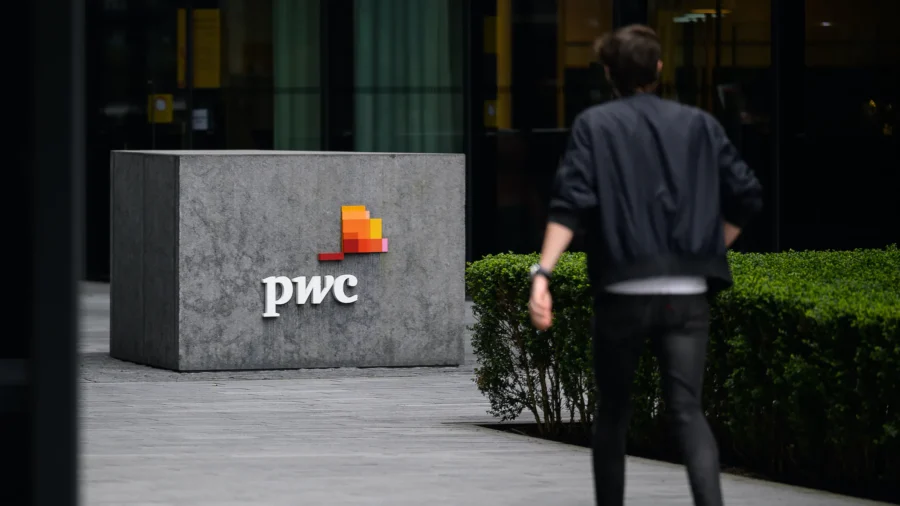PricewaterhouseCoopers’ (PwC) branches in China and Hong Kong received $7 million in fines after a U.S. regulator found they did not prevent cheating in their internal employee exams.
The Public Company Accounting Oversight Board (PCAOB) said on Nov. 30 that hundreds of individuals at PwC China and PwC Hong Kong engaged in training exam misconduct, resulting in the fines.
PCAOB also said that a mainland China-based firm, Shandong Haoxin, and four of its associated persons had violated U.S. securities laws and PCAOB rules and standards. The audit company has also agreed to pay $940,000 in fines.
The penalties followed a year after Beijing and Washington struck a landmark deal that allowed the PCAOB to inspect the books and records of Chinese companies listed on the New York Stock Exchange for the first time. The fines are among the biggest the PCAOB has issued and indicate that the inspection deal, a decade in the making, is working as hoped.
“The days of China-based firms evading accountability are over. The PCAOB is demonstrating that we will take action to protect investors in U.S. markets and impose tough sanctions against anyone who violates PCAOB rules and standards, no matter where they are located,” said PCAOB chair Erica Williams.
PwC is one of the big multinational accounting companies, offering accounting services to other multinational companies or corporations.
PCAOB said PwC branches failed to detect or prevent extensive answer-sharing on mandatory training courses. PCAOB added that the practice was widespread, involving more than 1,000 employees from PwC Hong Kong, and hundreds more from PwC China.
From 2018 to 2020, PwC workers “engaged in improper answer sharing—by either providing or receiving access to answers through two unauthorized software applications—in connection with online tests for mandatory internal training courses related to the firms’ US auditing curriculum,” according to the Congress-led watchdog.
The “overwhelming majority” of those staff ended up working for the firms’ assurance practices, which advise clients on how to make corporate disclosures, resulting in a gross violation of quality control standards, the PCAOB added.
Of the $7 million in fines, PwC Hong Kong was ordered to pay $4 million, while PwC China was ordered to pay $3 million.
The $4 million is “the second-highest penalty amount for any firm in PCAOB history, and $3 million matches the third highest amount,” Ms. Williams said.
PwC said they alerted PCAOB about the cheating.
“After becoming aware of these issues, the firms investigated these matters promptly and took remedial action,” the PwC branches said in identical statements, noting they reported the problems to the PCAOB.
“When we do not fully meet the high standards we set for ourselves we take action to learn lessons and commit to do better in the future,” PwC Hong Kong and China said.
PwC has operated in China since 1906 and bills itself as the country’s largest international accounting firm. The mainland Chinese arm collaborates with its Hong Kong and Macao offices, with about 20,000 staff collectively.
PwC was also fined $9.4 million (£7.5m) in the U.K. earlier this year for failures in auditing the engineering company Babcock’s accounts.
In this case, breaches included failure to challenge the management or gather sufficient evidence to understand contracts or basic audit requirements. The firm Babcock has highly sensitive contracts with the U.K. government, including with the Ministry of Defence.
Investors at Risk
For years, the United States has worried that the auditors of U.S.-listed Chinese companies were failing in their efforts, putting investors at risk. Beijing has had a history of not allowing the PCAOB access to its China-based firm auditors’ records, citing state secrecy concerns.
In August 2022, the two countries—spurred on by a new U.S. law that threatened to kick potentially 200 Chinese companies off U.S. exchanges—finally agreed on a framework for beginning inspections for eight audits.
“American investors are better protected when the PCAOB can audit the auditors of issuers listed in the United States,” U.S. Securities and Exchange Commission chair Gary Gensler said in a statement.
In May, the PCAOB said it found a slew of deficiencies in audits of U.S.-listed Chinese companies performed by PwC in Hong Kong and KPMG, another big accounting company. At the time, the regulator said it was common to find issues when first accessing a country’s auditors.
It did not disclose which companies’ audits it had selected for inspection, but Reuters has previously reported that Alibaba Group Holding and Yum China Holdings were among them.
The PCAOB’s inspections in the region are continuing, Ms. Williams said.
Reuters and CNN Wire contributed to this report.

